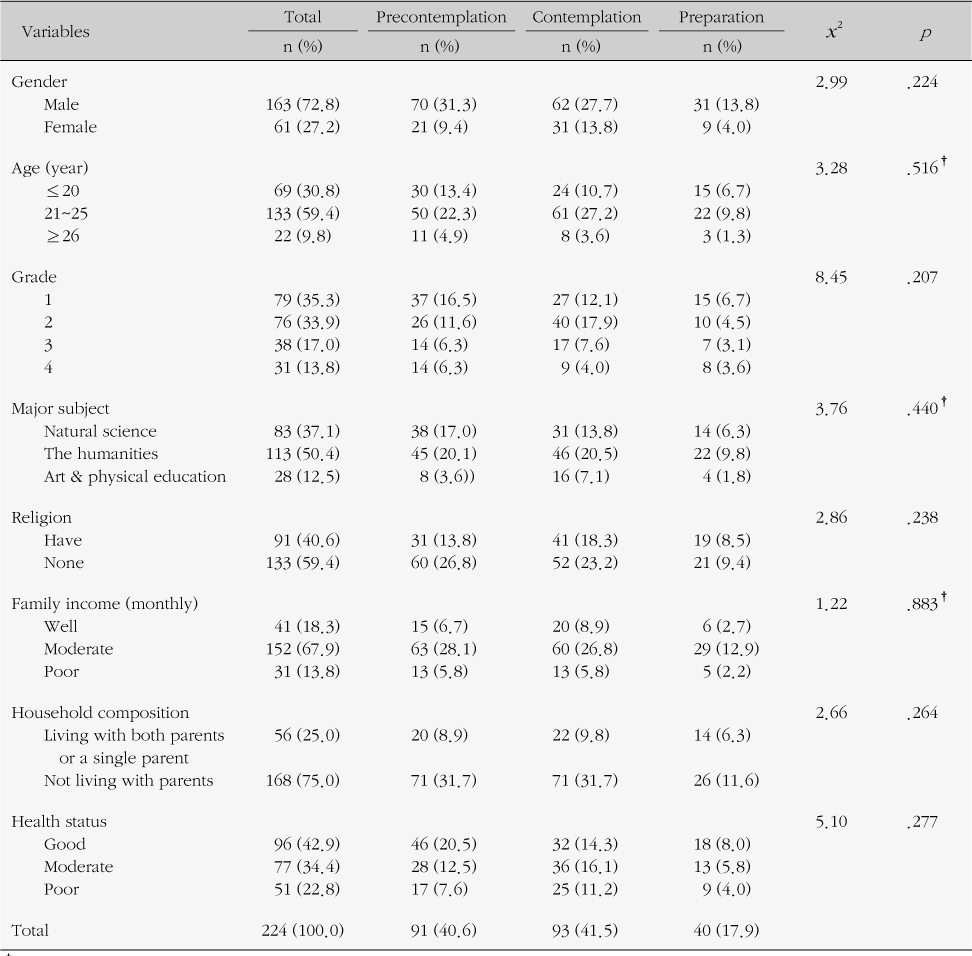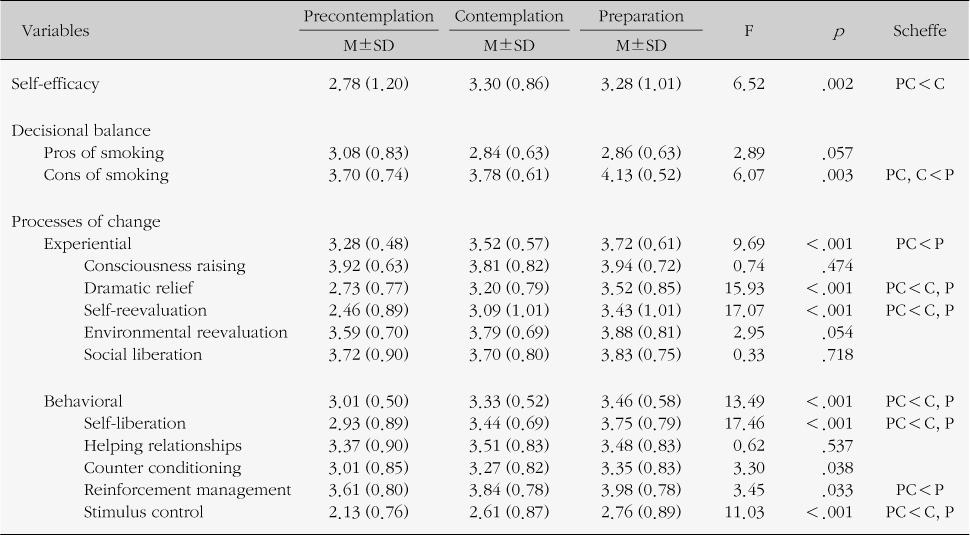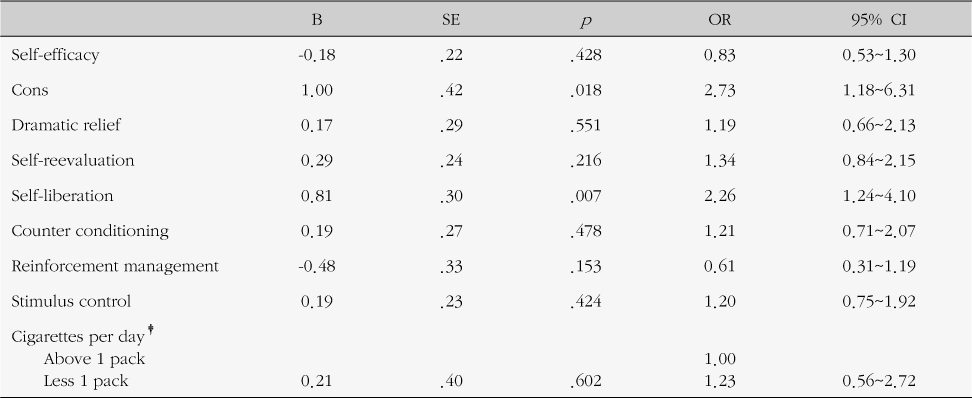Articles
- Page Path
- HOME > J Korean Acad Community Health Nurs > Volume 22(2); 2011 > Article
-
Original Article
- Factors Associated with the Preparation Stage to Quit Smoking among College Smokers
- Kyung-Shin Paek, Young-Sook Kwon
-
Journal of Korean Academy of Community Health Nursing 2014;22(2):173-183.
DOI: https://doi.org/10.12799/jkachn.2011.22.2.173
Published online: April 4, 2014
1Associate Professor, Department of Nursing, Semyung University, Korea.
2Full-time Lecturer, Department of Nursing, Joongbu University, Korea.
• Received: April 27, 2011 • Revised: June 8, 2011 • Accepted: June 9, 2011
© 2011 Korean Academy of Community Health Nursing
This is an Open Access article distributed under the terms of the Creative Commons Attribution Non-Commercial License (http://creativecommons.org/licenses/by-nc/3.0/) which permits unrestricted non-commercial use, distribution, and reproduction in any medium, provided the original work is properly cited.
- 603 Views
- 0 Download
- 5 Crossref
Abstract
-
Purpose
- This study was to compare the Transtheoretical Model components according to the stage of change in smoking cessation behavior and identify factors associated with preparation to quit smoking among college smokers.
-
Methods
- Data were collected from 224 undergraduate students using the self-report questionnaire. The survey variables comprised the stage of change in smoking cessation, self-efficacy, and decisional balance and process of change in smoking cessation.
-
Results
- There were significant differences in self-efficacy, cons of smoking, and the process of change according to the stage of change in smoking cessation behavior. Cons of smoking and self liberation were significant factors related to the preparation stage of smoking cessation.
-
Conclusion
- Strategies to enhance cons of smoking and self liberation in college smokers will be an important intervention component to prepare and plan smoking cessation in future studies.
- 1. Ahn OH, Yeun E, Kwon SB, Chung HK, Ryu E. Predictive factors of aspects of the transtheoretical model on smoking cessation in a rural community. J Korean Acad Nurs. 2005;35(7):1285–1294. ArticlePubMedPDF
- 2. Chang SO, Kim EJ, Kil SY, Seomun GA, Lee SJ. Influential Variables on Intention and Action to Quit Smoking between Adolescent Smokers and Adult Smokers-Based on the Transtheoretical Model. J Korean Acad Nurs. 2005;35(7):1410–1419. ArticlePubMedPDF
- 3. Froelicher ES, Kozuki Y. Theoretical applications of smoking cessation interventions to individuals with medical conditions: Women's initiative for nonsmoking (WINS)-Part III. Int J Nurs Stud. 2002;39(1):1–15. ArticlePubMed
- 4. Gil KM, Schrop SL, Kline SC, Kimble EA, McCord GM, McCormick KF, et al. Stages of change analysis of smokers attending clinics for the medically underserved. J Fam Pract. 2002;12;51(12):1018. Retrieved April 6, 2011, from http://www.jfponline.com/Pages.asp?AID=1351&issue=December%202002&UID=
- 5. Ham OK. Stages and processes of smoking cessation among adolescents. West J Nurs Res. 2007;29(3):301–315. ArticlePubMedPDF
- 6. Hazen DA, Mannino DM, Clayton R. Gender specific differences in the pros and cons of smoking among current smokers in Eastern Kentucky: Implications for future smoking cessation interventions. Int J Environ Res Public Health. 2008;5(4):230–242. ArticlePubMedPMC
- 7. Hoeppner BB, Veliver WF, Redding CA, Rossi JS, Prochaska JO, Pallonen UE, et al. Psychometric evaluation of the smoking cessation processes of change scale in an adolescent sample. Addict Behav. 2006;31(8):1363–1372. ArticlePubMed
- 8. Kim MY, Suh SL, Ham OK. Stages and processes of smoking cessation among high school students in rural community. J Korean Acad Community Health Nurs. 2007;18(3):431–440.
- 9. Kim SJ, Moon SY, Han KS. The actual condition of smoking among university students. J Korean Community Nurs. 2002;13(1):147–160.
- 10. Kim YH. Adolescents' smoking behavior and its relationships with psychological constructs based on transtheoretical model: A cross-sectional survey. Int J Nurs Stud. 2006;43(4):439–446. ArticlePubMed
- 11. Korean Association of Smoking & Health. The prevalence of smoking among Korean adults in 2010 2010;Retrieved March 28, 2010. from http://www.kash.or.kr/user_new/main.asp
- 12. Lee HS. A study on evaluation of effects of juvenile smoking cessation program applied by transtheoretical model. Busan: Inje University; 2004. Unpublished doctoral dissertation.
- 13. Macnee CL, McCabe S. The transtheoretical model of behavior change and smokers in Southern Appalachia. Nurs Res. 2004;53(4):243–250. ArticlePubMed
- 14. Oh HS, Kim YR. Changing mechanisms corresponding to the changing stages of smoking cessation. J Nurs Acad Soc. 1996;26(4):820–832. ArticlePDF
- 15. Oh HS, Kim YR. Factor Analysis on Behavior Change Mechanisms in Self-help Smoking Cessation. J Nurs Acad Soc. 1996;26(3):678–687. ArticlePDF
- 16. Oh HS, Kim YR. Exploratory study on developing model for smoking cessation process. J Nurs Acad Soc. 1997;27(1):71–82. ArticlePDF
- 17. Otsuki M, Tinsley BJ, Chao RK, Unger JB. An ecological perspective on smoking among Asian American college students: The roles of social smoking and smoking motives. Psychol Addict Behav. 2008;22(4):514–523. ArticlePubMed
- 18. Pallonen UE. Transtheoretical measure for adolescent and adult smoker: Similarities and differences. Prev Med. 1998;27(5 Pt 3):A29–A38. PubMed
- 19. Park NH, Kim JS, Lee YM. Factors associated with the stage of change of smoking cessation behavior in adolescents. J Korean Acad Nurs. 2003;33(8):1101–1110. ArticlePubMedPDF
- 20. Preston DB, Greene GW, Irwin PA. An assessment of college health nursing practice: A wellness perspective. J Community Health Nurs. 1990;7(2):97–104. ArticlePubMed
- 21. Prochaska JO, DiClemente CC. Stages and process of self-change of smoking: Toward and integrative model of change. J Consult Clin Psychol. 1983;51(3):390–395. PubMed
- 22. Prochaska JO, Velicer WF. The transtheoretical model of health behavior change. Am J Health Promot. 1997;12(1):38–48. ArticlePubMedPDF
- 23. Prochaska JO, Velicer WF, Diclemente CC, Fava JL. Measuring the processes of change: Applications to the cessation of smoking. J Consult Clin Psychol. 1988;56(4):520–528. PubMed
- 24. Prochaska JO, Velicer WF, Rossi JS, Goldstein MG, Marcus BH, et al. Stages of change and decisional balance for 12 problem behavior. Health Psychol. 1994;13(1):39–46. PubMed
- 25. Rigotti NA, Moran SE, Wechsler H. US college students' exposure to tobacco promotions: Prevalence and association with tobacco use. Am J Public Health. 2005;95(1):138–144. ArticlePubMedPMC
- 26. Schüz B, Sniehotta FF, Mallach N, Wiedemann AU, Schwarzer R. Predicting transitions from preintentional, intentional and actional stages of change. Health Educ Res. 2009;24(1):64–75. ArticlePubMed
- 27. Shin SR, Linda S, Leda D. Tobacco-related education in graduate, baccalaureate and associate degree programs in Korea. J Korean Acad Nurs. 2003;33(2):256–264. ArticlePubMedPDF
- 28. Son HM. Differences in Processes of Change, Decisional Balance, and Temptation Across the Stages of Change for Smoking Cessation. J Korean Acad Nurs. 2005;35(5):904–913. ArticlePubMedPDF
- 29. Waters K, Harris K, Hall S, Nazir N, Waigandt A. Characteristics of social smoking among college students. J Am Coll Health. 2006;55(3):133–139. ArticlePubMedPMC
- 30. Yalçinkaya-Alkar O, Karanci AN. What are the differences in decisional balance and self-efficacy between Turkish smokers in different stages of change? Addict Behav. 2007;32(4):836–849. ArticlePubMed
Figure & Data
References
Citations
Citations to this article as recorded by 

- The association of stage of change for smoking cessation with smoking knowledge and attitude in women college students of Seoul, Korea
Haena Kim, Kang-Sook Lee, Yeji Lee, Eunji Cho, Kyung Min Kim
Korean Journal of Health Education and Promotion.2019; 36(1): 69. CrossRef - Comparisons of the stages and psychosocial factors of smoking cessation and coping strategies for smoking cessation in college student smokers: Conventional cigarette smokers compared to dual smokers of conventional and e‐cigarettes
HyunSoo Oh, BoAe Im, WhaSook Seo
Japan Journal of Nursing Science.2019; 16(4): 345. CrossRef - A Study on the Factors Related to Smoking and Smoking Conditions among College Students in Some Area
Kyeong-Ah Kim
Journal of the Korea Academia-Industrial cooperation Society.2016; 17(8): 465. CrossRef - Development of a Scale to Measure Reproductive Health Promoting Behavior of Undergraduates
Ho Yoon Jo, Young Hae Kim, Hyun Mi Son
Korean Journal of Health Education and Promotion.2014; 31(5): 29. CrossRef - Effects of Smoking Cessation Education for Male College Students
Mi-Kyung Kwon, Kyung-Sook Bang
The Journal of Korean Academic Society of Nursing Education.2013; 19(4): 640. CrossRef

 KACHN
KACHN




 PubReader
PubReader Cite
Cite

